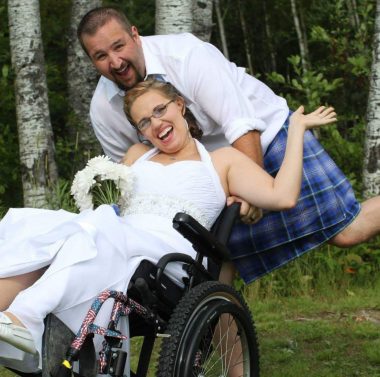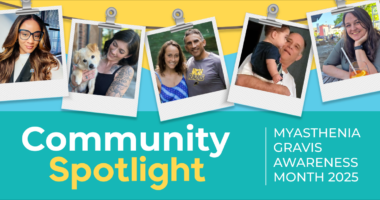How to plan a stress-free wedding when you live with chronic illness
10 years later, reflections on what made my marriage ceremony successful

Daisies and strawberry shortcake. Blue tartan and outdoor seating. Home and a new name.
On Aug. 10, my husband, Justin, and I will celebrate 10 years of marriage.
Our wedding day was amazing, thanks to the many careful decisions we made. Although some viewed our choices as selfish, they were the right ones for my health.
Ten years go, my health was not well managed. I was exhibiting symptoms of myasthenia gravis, though I didn’t have a diagnosis at the time. I was having several seizures each month due to my seizure disorder, and I hadn’t yet learned the techniques I now use to keep my post-traumatic stress disorder under control.
For my 10-year anniversary, I want to celebrate by sharing some tips for planning a stress-free wedding with chronic illness.
Tip No. 1: Be selfish
Make the decisions that are best for you. Do you want to have your wedding at your house, even if that means people will have to travel to attend? Then host it at home. It’s what we did.
I wanted to be in a familiar environment that was already set up for my needs, just in case I had a seizure or my legs gave out. Many family and friends chose not to attend as a result, and that’s OK. Getting married at home was what I wanted, and it was in my best interest.
Tip No. 2: Keep it simple
Avoid the stress of an overly produced, chaotic, and extravagant wedding. There’s no need to “keep up with the Joneses.” Keep. It. Simple. From the ceremony to the reception.
We opted for a potluck at our reception, inviting guests to bring their favorite dish and share the recipe with us. It was our way of including our loved ones in our plans; plus, it helped keep costs down. The goal was to enjoy the day in a relaxed and comfortable environment. We succeeded.
Tip No. 3: Use the mobility aids
I used several mobility aids on my wedding day. My son pushed me down the aisle in my wheelchair, and I used forearm crutches and a cane to get around.
Don’t push yourself to the point of exhaustion, leaving you unable to enjoy your day. By using a combination of the aids at my disposal, I was able to actively participate and have fun without sacrificing my health.
Tip No. 4: Find a wedding dress with a short train
I loved my dress. It had a beaded bodice, was comfortable to wear with any mobility aid (yes, including my wheelchair), and I felt amazing in it. It had a short, sleek train that was comfortable to sit on and didn’t get caught in my wheelchair. When you go dress shopping, let the attendant know if you’ll be using a wheelchair, and avoid the poofy, tulle dresses.
Tip No. 5: Have fun
Once you’ve finished planning and taken any necessary precautions, you’ll be able to truly enjoy your day. Don’t let flare fear ruin your wedding. Pace yourself, soak it all in, and have fun.
As with anything, we can have our cake and eat it, too, with a bit of planning, understanding, and graceful acceptance of our abilities.

Columnist Shawna Barnes and her husband, Justin, at their wedding in 2013. (Courtesy of Shawna Barnes)
Note: Myasthenia Gravis News is strictly a news and information website about the disease. It does not provide medical advice, diagnosis, or treatment. This content is not intended to be a substitute for professional medical advice, diagnosis, or treatment. Always seek the advice of your physician or other qualified health provider with any questions you may have regarding a medical condition. Never disregard professional medical advice or delay in seeking it because of something you have read on this website. The opinions expressed in this column are not those of Myasthenia Gravis News or its parent company, Bionews, and are intended to spark discussion about issues pertaining to myasthenia gravis.








Leave a comment
Fill in the required fields to post. Your email address will not be published.